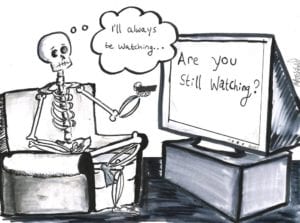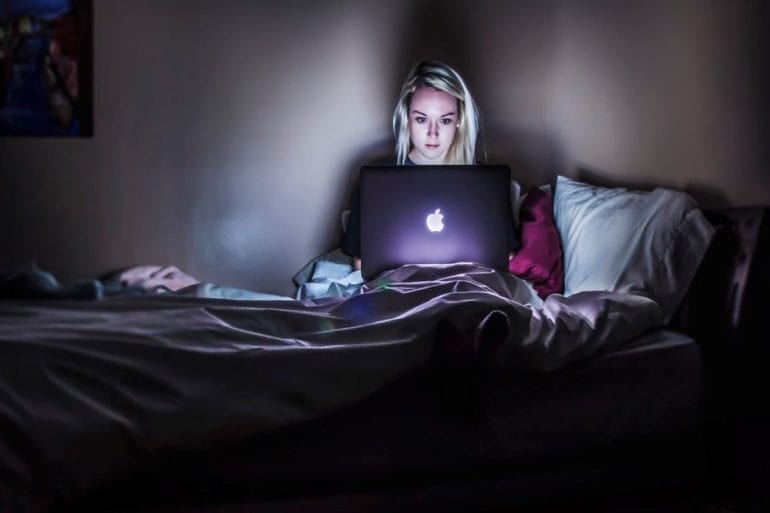
Q: What is the psychology behind binge watching and why are so many people resorting to binge watching during sheltering in place?
Dr. Tobiasz: Binge-watching can be defined as viewing multiple episodes of a television show in one sitting. Binging, just like any hobby or leisure activity, may satisfy the need for entertainment and enhance or maintain positive emotions. While sheltering in place, one might become overwhelmed with the sad news associated with the global pandemic and use binging as an escape. Binging may bring temporary relief from the increased stressors associated with sheltering in place. Stressors like daily stress of school, work, parenting, self-isolation, or being in close quarters with others. One may spend time binging their favorite TV shows to experience the same degree of satisfaction they experienced before the pandemic began.
Q: What impact does binge watching have on our health, specifically, mental health?
Dr. Tobiasz: Sitting or lying on the couch for long periods of time increases one’s risk of health issues. It can have negative impacts on one’s spine, muscles, and lungs. One may be at an increased risk for heart disease and diabetes. This risk is compounded when one binges on snacks, junk food, and alcohol while simultaneously binging on TV.
Binge watching may also have an effect on one’s mental health. Some individuals may experience increased fatigue, disturbances in sleep, self-isolation, low self-esteem, and loneliness that can lead to depression. For others, binge watching may lead to fear of missin g out (FoMo) – a pervasive apprehension that others might be having rewarding experiences from which one is absent or missing – leading to increased anxiety.
g out (FoMo) – a pervasive apprehension that others might be having rewarding experiences from which one is absent or missing – leading to increased anxiety.
Q: Can binge watching become an addiction? If yes, how can people break this cycle?
Dr. Tobiasz: Binge watching could become an addiction if one watches TV longer than intended or one has unsuccessful attempts to control, reduce, or cut down watching. Binging has the possibility of negatively affecting other aspects of one’s life, such as neglecting other responsibilities like schoolwork, one’s job, or family obligations.
To best manage binge watching, holding oneself accountable is key. Limit oneself to a smaller number of episodes, such as two or three. Then turn off the TV to balance it with reading or another hobby. Set a timer if needed. Disable the “autoplay” feature so that once an episode concludes the next episode does not automatically start. Keep the shades open during the day and the lights turned on to not lose sense of time. Balance physical activities with binging – for every 30 minutes of TV watched exercise for 30 minutes.
Q: Are there positive effects of binge watching?
Dr. Tobiasz: Binge watching can increase social connectivity, particularly during sheltering in place when one may feel disconnected from others. Shows may provide topics for discussion, enable individuals to keep up with others, and provide the opportunity to share emotions with others. For those who are isolated or fear missing out, binge watch your favorite shows simultaneously with others through the use of digital platforms. Share your cameras and screens and discuss the show in “real time” while you are watching it. For those who prefer watching a show in silence, use the chat box features within digital platforms to connect in “real time.” And plan your snacks – prepare healthy foods such as fruits and vegetables for your next binge.
disconnected from others. Shows may provide topics for discussion, enable individuals to keep up with others, and provide the opportunity to share emotions with others. For those who are isolated or fear missing out, binge watch your favorite shows simultaneously with others through the use of digital platforms. Share your cameras and screens and discuss the show in “real time” while you are watching it. For those who prefer watching a show in silence, use the chat box features within digital platforms to connect in “real time.” And plan your snacks – prepare healthy foods such as fruits and vegetables for your next binge.
Dr. Ryan Tobiasz is the department chair for the Forensic Psychology Program at The Chicago School of Professional Psychology’s Washington, D.C. Campus.
_______________________________________________________________________________________
Learn more about The Chicago School
If you would like to learn more about the academic programs available at The Chicago School of Professional Psychology, please fill out the form below to request more information, or you can apply today through our application portal.

